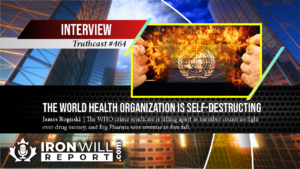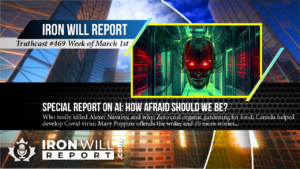Understanding Not Fearing Corona Variants | Interview with Dr. Mark Trozzi
February 2, 2022
Dr. Trozzi was an emergency room doctor in Ontario who took a sabbatical to dedicate his time to researching all facets of the coronavirus known as SARS-COV-2. Dr. Trozzi returns to discuss his findings; the intricacies of coronavirus, its variants and how to remain fearless in the face of a virus that is no more a threat to humanity than the common cold.
On how dangerous any variant of coronavirus can be…
That’s one reason why we need to stop where we’re at now. We already have variants evolving within the injection victims, which are particularly dangerous for the injection victims. Which is why when you peer into the data, even with a lot of coverup attempted, you see that there is increasing cases, increasing disease, increase in severity in people who’ve been injected, even if some get a couple months of protection. This points to a difference and there is a reason for people who have not had spike protein production triggered in their body through the injection of modified coronavirus genetic material.
On the creation of variants like Delta and Omicron…
People shouldn’t panic about variants because when you look at the genetic code of humans and you go into ancient history, the human genome is protected by a range of 20% of the human genetic code; that was incorporated ultimately into our cells from infectious materials. It’s not a terrible thing to have a little coronavirus that is out there and doesn’t really make people sick and we’re done with it, but there’s another way variants can evolve. This is what Geert Vanden Bossche and other honest virologists, immunologists and vaccinologists have been warning us about and is happening…the antibodies that are triggered by this are antibodies to last year’s model of their gain of function spike protein. The antibodies that are triggered in the injection victims are very specific…they recognize and attach to the spike protein as it existed when they made the injections.
On how this would look in layman’s terms…
Let’s imagine that your ears are like your spike protein. Imagine if my immune system recognizes your ears or variations of your ears from last year. If you change your ears a little bit, I won’t recognize it and you can persist, right? This is how these injections stimulate the evolution because natural immunity recognizes the whole virus, many different facets of it, many different markers on its surface as well as its spike proteins. The coronavirus can’t just change its spike protein a little bit and trick a natural person’s immune system. That is why we see in studies that SARS-COV-1 from 18 years prior, was very different, it’s 20% different, it’s another branch of the coronavirus family, but people who had a SARS-COV-1 infection and got better, a lot of people do and to have a cold, even 18 years later, their immune system was robust and strong against SARS-COV-2.
Please share on your social media accounts
Want Your Country Back?
We are in desperate need of monthly recurring donations so we can hire assistants to create more tools in a timely manner. Donate below!
Can You Donate Monthly?
Please consider making your donation monthly. This allows us to make commitments to produce tools and content we otherwise cannot.








